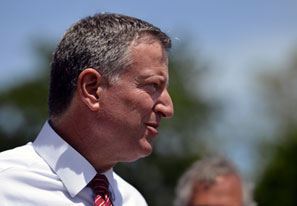
This week, Mayor Bill de Blasio traveled from New York, a state with one of the highest levels of income inequality in America, according to research by University of Washington professor Richard Morrill, to Iowa, a state with one of the lowest levels of inequality, in order to lecture Iowans on . . . how to end inequality! While in Iowa, the second-year mayor repeatedly blasted the rich for not paying enough in taxes. In one speech, he mentioned taxes some 20 times. What de Blasio neglected to explain to Iowans, though, is how New York, which already has some of the highest taxes in America (especially on the wealthy and on businesses), hasn’t managed to moderate or restrain the growth of inequality, while Iowa (which taxes its residents below the national average, according to the Tax Foundation) apparently has.
De Blasio was in Iowa because prospective presidential candidates are visiting the state, and the mayor wants to ensure that income inequality figures prominently in the discussion. But once de Blasio ventured outside of his comfort zone of bashing the wealthy—especially the Wall Street executives and hedge-fund managers whom he loves to treat as villains—his policy proposals were anything but coherent. Two of de Blasio’s national agenda items, for instance, are to hike the minimum wage and require all businesses to grant mandatory sick-leave time to workers. But hedge funds and Wall Street firms already pay workers way above the minimum wage, of course, and offer some of the best employee benefits around. The real burden of de Blasio’s solutions would fall not on them, but on small firms, many of which struggle to make a profit and don’t have extra cash lying around. That’s why decades of research by economists have shown that raising the minimum wage almost always increases unemployment, as hard-pressed small firms hire fewer workers.
Finally, a reason to check your email.
Sign up for our free newsletter today.
De Blasio couldn’t very well start off his Iowa speech bashing small businesses, but he’s no friend to them, as his mayoralty is showing back in New York. When the uber-progressive New York City Council held hearings on a law to expand mandatory sick leave, for instance, the council chambers overflowed as de Blasio administration representatives testified in favor of the idea. After they finished, the de Blasio team as well as most city council members walked out—before small-business groups, including several minority business associations, could share their thoughts on the matter. So a nearly empty chamber didn’t hear the head of a 200-member Hispanic supermarket association testify that the legislation—which not only required mandatory sick leave but also necessitated a significant increase in paperwork for businesses—“could create havoc with small independent supermarkets,” especially as “this burden falls on supermarkets just as they face other burdens, like the Affordable Care Act.”
While in the Hawkeye State, de Blasio also felt compelled to explain how he would spend the proceeds from all the new tax money he covets. One of his big agenda items is universal pre-K across America—a prime example of how New York’s mayor is a “spend first, worry about results later” politician. Pre-K is not a new idea—it’s been around for decades and academics have studied it extensively. The singular result of these studies is that pre-K demonstrates little lasting educational value for most kids, with the sole exception being some small, well-run programs for poor children, who seem to benefit from a head start on schooling. But even that small advantage almost always vanishes by third grade. Universal pre-K’s real appeal is as a tool for teachers’ unions to boost membership, one reason why the issue has such passionate advocates.
The mayor’s other big-spending idea is to pour more money into infrastructure. But the rest of the nation might pause before taking advice from a New Yorker on the subject. As City Journal’s Aaron Renn noted recently, the city wastes billions of dollars on poorly conceived and poorly executed infrastructure projects, thanks to conscious decisions to overspend by ignoring union featherbedding, mandating “buy American” programs for materials, and requiring protracted environmental reviews. De Blasio recently urged Congress to fund more infrastructure spending, but as Renn noted, “how can New York demand Congress do its job if the city and region won’t take care of its own by doing its part to stop this [spending] insanity?”
A closer look at de Blasio’s message in Iowa reveals that his broader theme is about supporting a labor-union-friendly agenda—but that isn’t a cure for inequality, either. It certainly hasn’t worked out that way in New York, where one-quarter of all workers are unionized—more than double the percentage than in more-equal, right-to-work Iowa, where only 11 percent of workers belong to unions. One can only hope that Iowans recognize the quality of the advice they’re getting from New York City’s mayor.